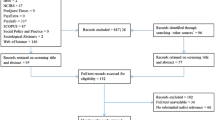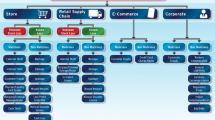Abstract
Retailers face difficult and expensive decisions regarding what loss prevention intervention they should use to reduce shrink. A Randomized Controlled Trial (RCT), based on the experimental research approach, can provide retailers with valuable information regarding the effectiveness of a loss prevention intervention. Implementing a RCT in the real world of retailing, however, presents several challenges to the validity of the results. This article, based on the experience of implementing several RCT projects for retailers, examines the threats to the validity of the results. It also provides practical recommendations for correcting the threats to validity. This article also recommends that researchers and retailers must collaborate to implement effective RCT research projects.
Similar content being viewed by others
References
Clarke, R.V. and Eck, J.E. (2005) Crime Analysis for Problem Solvers in 60 Small Steps. Washington, DC: US Department of Justice, Office of Community Oriented Policing Services.
Cook, T. (1991) Clarifying the warrant for generalized causal inferences in quasi-experimentation. In: M.W. McLauchlin and D.C. Phillips (eds.) Evaluation and Education: At Quarter Century. Chicago, IL: University of Chicago Press.
Cook, T. and Campbell, D. (1979) Quasi-experimentation: Design and Analysis for Field Settings. Boston, MA: Houghton Mifflin.
Eck, J.E. and Madensen, T. (2009) Using signatures of opportunity to examine mechanisms in crime prevention evaluations. In: J. Knutsson and N. Tilley (eds.) Crime Prevention Studies, Volume 24 : Evaluating Crime Reduction Initiatives. Monsey, NY: Criminal Justice Press.
Farrington, D.P. (2003) Methodological quality standards for evaluation research. The Annals of the American Academy of Political and Social Science 587: 49–67.
Isaac, S. and Michael, W. (1995) Handbook in Research and Evaluation: For Education and the Behavioral Sciences, 3rd edn. San Diego, CA: Educational and Industrial Testing Services.
Reynolds, K. and West, S. (1987) A multiplist strategy for strengthening nonequivalent control group designs. Evaluation Review 11 (6): 691–714.
Spector, P. (1981) Research Designs. Beverly Hills, CA: Sage Publications.
Welsh, B.C. and Farrington, D.P. (2005) Evidence-based crime prevention: Conclusions and directions for a safe society. Canadian Journal of Criminology and Criminal Justice 47 (2): 337–349.
Wiersma, W. (2000) Research Methods in Education: An Introduction, 7th edn. Needham Heights, MA: Allyn and Bacon.
Author information
Authors and Affiliations
Rights and permissions
About this article
Cite this article
Scicchitano, M. Randomized Controlled Trials for loss prevention research: Process and problems. Secur J 24, 217–224 (2011). https://doi.org/10.1057/sj.2011.10
Published:
Issue Date:
DOI: https://doi.org/10.1057/sj.2011.10




